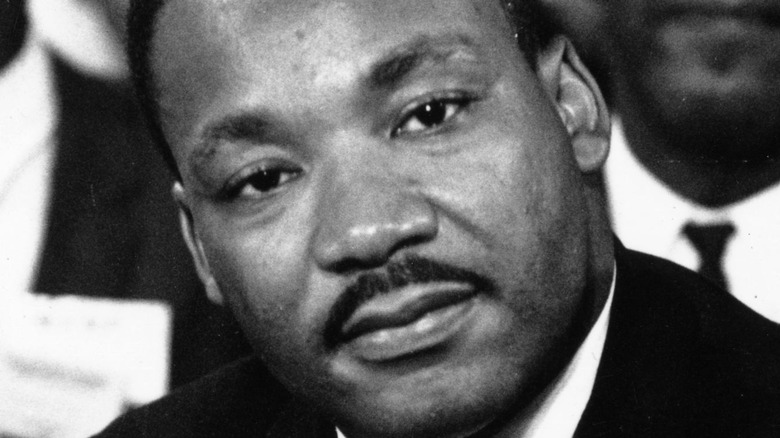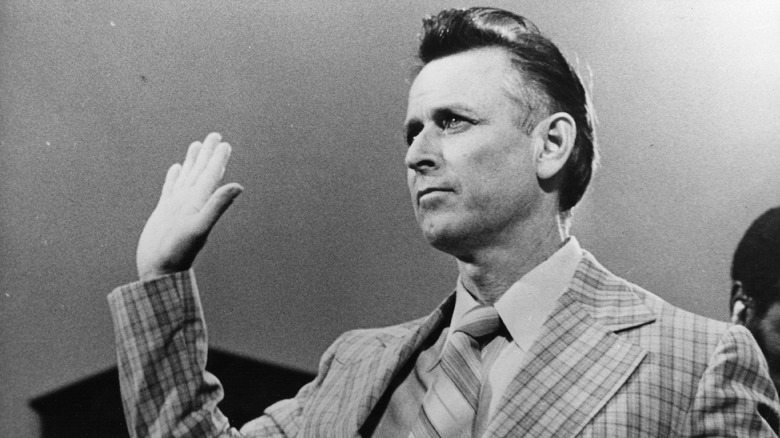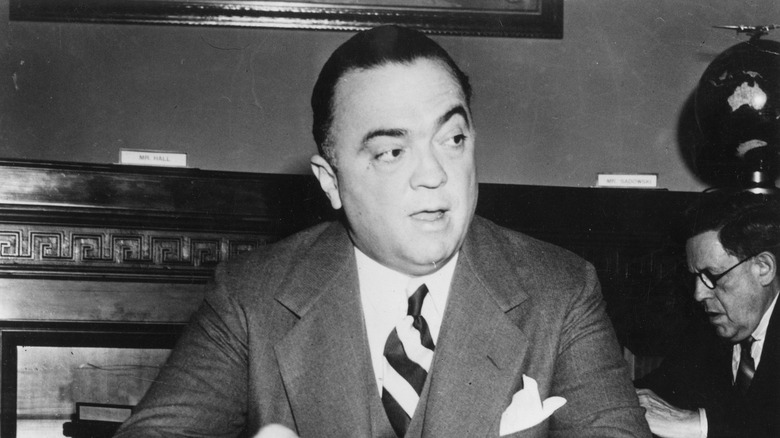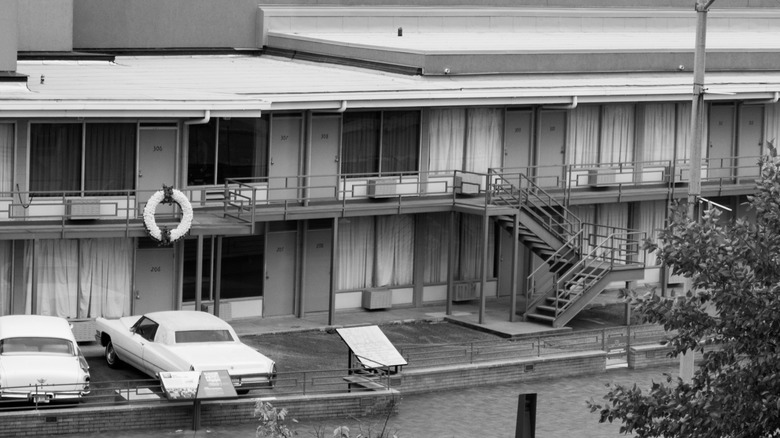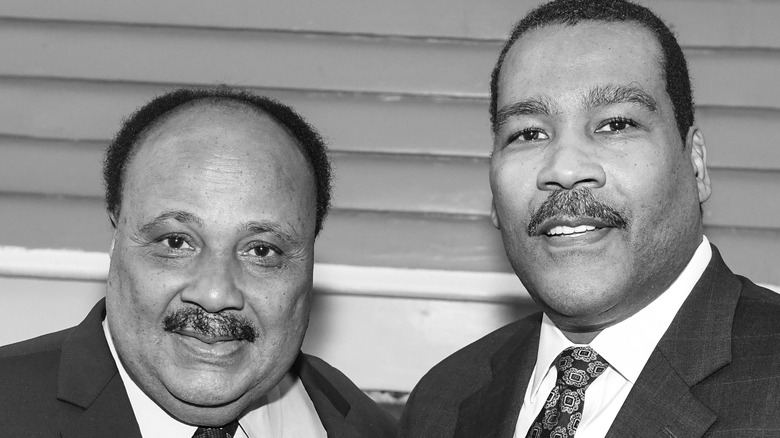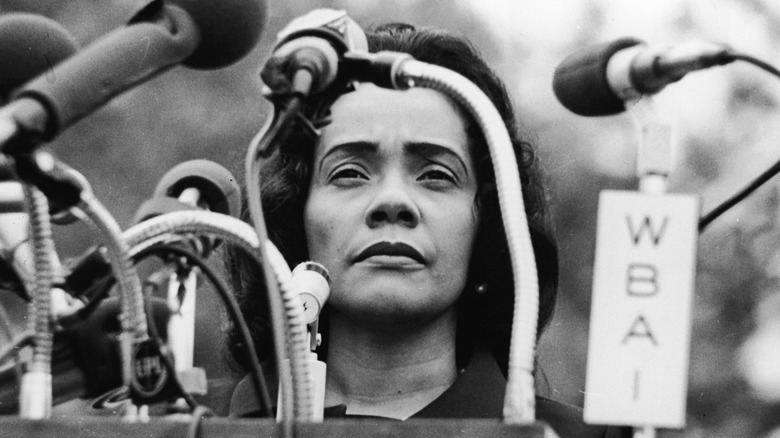The Startling Reason Martin Luther King Jr's Family Met With Convicted Killer James Earl Ray
On April 4, 1968, at 6:05 pm, the civil rights leader Martin Luther King, Jr. was shot while standing on the balcony outside his room at the Lorraine Motel in Memphis, Tennessee. King had been in Memphis to show his support for the city's sanitation workers, who were striking for better working conditions. The night before, he had given a resounding speech to a packed crowd at the Bishop Charles Mason Temple, ending with the famously prophetic lines "I'm happy tonight. I'm not worried about anything. I'm not fearing any man. Mine eyes have seen the glory of the coming of the Lord," per CNN.
King was rushed to the nearby St. Joseph's Hospital, where he was pronounced dead at 7:05 pm after undergoing an unsuccessful emergency surgery, according to the King Institute. King's death sparked immediate outrage and unrest, and in the immediate aftermath, riots broke out in over 100 cities across the country, including Baltimore, Chicago, and Washington, D.C. President Lyndon Johnson declared April 7 a national day of mourning, and King's body was laid to rest at South-View Cemetery two days later.
Authorities found James Earl Ray's fingerprints on the murder weapon
King's assassination kicked off what was then the largest FBI investigation in the country's history. Authorities determined the shot had come from the South Main Street boarding house, directly across the street from the Lorraine Motel. It didn't take long for investigators to discover the murder weapon, a 30.06 Remington rifle, which was wrapped up and dumped on the sidewalk next door to the boarding house, along with binoculars and a newspaper article about King's stay at the Lorraine Motel. Fingerprints left behind on the gun soon led investigators to James Earl Ray, who was a known white supremacist, as well as a career criminal, according to History.
There was only one problem: James Earl Ray had fled the country. By the time the Feds had caught up with him, Ray had escaped a 20-year sentence at the Missouri State Penitentiary and was living abroad in London, England. An international manhunt was launched, and two months after King's death, Ray was apprehended at the London Heathrow Airport, while trying to make a break for it with falsified Canadian documents, and taken back to the United States to stand trial for the murder of Martin Luther King Jr.
The FBI kept surveillance on Martin Luther King Jr.
As part of a plea bargain, Tennessee prosecutors agreed not to seek the death penalty against James Earl Ray (via the King Institute). On March 10, 1969, Ray confessed to King's assassination. He was found guilty and sentenced to 99 years in prison. However, just three days later, Ray recanted his whole story, but by then it was too late, per How Stuff Works. There would be no retrial.
However, there were plenty of people who were skeptical of Ray's conviction, most notable among them members of King's own family. In fact, King's family did not trust the FBI at all, and with good reason. For much of King's public life, beginning with his involvement in the Montgomery bus boycotts in 1955, the FBI had been keeping tabs on King, keeping surveillance on him and even wiretapping his phone, according to the King Institute. Then-FBI Director J. Edgar Hoover was particularly hostile towards King, monitoring his movements, along with other civil right's leaders, as part of the organization's new Racial Matters Program. Hoover also believed that King was a secret Communist, a belief that was further fueled when King became an outspoken opponent of the Vietnam war. They also feared he could emerge as a black nationalists leader, so throughout the 1960s, the FBI kept a close watch on King.
The King family believed Ray was innocent
The official FBI investigation found that James Early Ray was a lone gunman who, motivated by racism, acted alone in plotting and carrying out King's assassination. However, the King family took the FBI's findings with a heavy grain of salt. King's widow, Coretta Scott King, was immediately suspicious of the FBI's investigation. She would later say that there was "overwhelming evidence that identified someone else, not James Earl Ray, as the shooter, and that Mr. Ray was set up to take the blame," via History.
There were many suspicions that a broader conspiracy was at play. The feeling that a conspiracy was being covered up was only heightened by Ray's almost immediate recanting of his guilt. After his trial, Ray insisted that he had not acted alone. Instead, he claimed that a mysterious man named "Raoul" was the real brains behind the murder, directing Ray to purchase the rifle and rent a room at the boarding house. However, no evidence of Raoul's real identity was ever uncovered, and most authorities do not believe he exists. Regardless, many public figures, including King's wife and children, and other civil right's leaders like Rep. John Lewis, began to believe that there was much more to the story than what the government was releasing, per the Washington Post.
A Memphis restaurant owner claimed to have been involved in the plot to kill King
In 1997, the King family went public with their belief that James Early Ray was innocent, calling for a reinvestigation into King's assassination. That same year, Martin Luther King Jr's son, Dexter Scott King, visited Ray in prion and asked him point blank "Did you kill my father?" Ray denied it. The King family began advocating for his release, saying the FBI had arrested the wrong man. "It pains my heart that James Earl Ray had to spend his life in prison paying for things he didn't do," King's youngest daughter, Bernice King, told the Washington Post.
Their belief was further strengthened when a man named Loyd Jowers, who owned a restaurant below the infamous Memphis boarding house, came forward claiming to have also been involved in the assassination plot. According to History, Jowers implicated a number of other high profile people in his confession, including the Mafia and the Memphis police, saying that Ray had simply been the fall guy for these more powerful individuals.
A 1999 government reinvestigation concluded Ray acted alone
In 1999, the King family filed a civil suit against Loyd Jowers and "other unknown co-conspirators," asking for the small yet symbolic sum of just 100 dollars (via the trial transcript). After a lengthy trial, in which over 70 witnesses came forward to testify, the jury ruled in the King family's favor, determining that Jowers had been involved in a conspiracy to kill the civil rights leader, via History. "Justice has been well served in their deliberations," Coretta Scott King said of the verdict in a press conference, adding "in addition to Mr. Jowers, the conspiracy of the Mafia, local, state and federal government agencies, were deeply involved in the assassination of my husband."
That same year, King's widow successfully convinced President Bill Clinton to reopen an official government investigation into Martin Luther King Jr.'s death. Civil rights special counsel Barry Kowalski was assigned to the case and tasked with reviewing any new evidence of conspiracy that had come to light over the years. However, the official government conclusion was the same as it had been over 30 years prior: Kowalski determined that James Earl Ray was guilty, and he had acted alone, according to the Washington Post. However, while the official story may still be that James Early Ray was a lone gunman, suspicious of a broader conspiracy continue to surround the assassination of Martin Luther King Jr. to this day.
